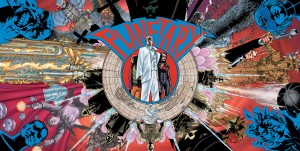- Batman and Robin #5, by Grant Morrison, Philip Tan & Jonathan Glapion (DC)
- Planetary #27 of 27, by Warren Ellis & John Cassaday (DC/Wildstorm)
- Criminal: The Sinners #1, by Ed Brubaker & Sean Phillips (Marvel/Icon)
- Astonishing X-men #31, by Warren Ellis, Phil Jimenez & Andy Lanning (Marvel)
- Absolution #2 of 6, by Christos Gage & Roberto Viacava (Avatar)
- Irredeemable #7, by Mark Waid & Peter Krause (Boom)
- Witchfinder: In The Service of Angels #4 of 5, by Mike Mignola & Ben Stenbeck (Dark Horse)
- The Boys #35, by Garth Ennis & Darick Robertson (Dynamite)
- Star Trek: Romulans: Schism #2 of 5, by John Byrne (IDW)

|
Once upon a time there was a little comic book series called Planetary. It was part of the Wildstorm universe, nominally (it crossed over with The Authority, for example), but really it was a series that stood on its own: A group of adventurers bankrolled by a large corporation whose head stayed in the shadows explored the secret history of the world.
Okay, I’ll fess up: Ten years ago Planetary was my favorite comic book being published. Well, maybe I liked Astro City as much (and I like Astro City an awful lot), but for a while Planetary was the one I looked forward to the most. In addition to weaving a clever tapestry of a world with an exotic and mysterious background, it was a pastiche of various pop culture settings. The preview was a dark take on the Hulk, and the first issue featured Doc Savage and six other characters of the pulp era, having tried and failed to save the world through superscience in the 1930s, and who were then lost for 50 years. The second issue put a new spin on 50s Japanese monster films, and the third was a spooky Hong Kong action film. And so on. They were smartly written by Warren Ellis, and lavishly illustrated by John Cassaday, both names which were new to me at the time (I’d seen an X-Men mini-series Cassaday had illustrated before, and I hadn’t read Ellis’ Transmetropolitan yet). The series started out monthly, then went bimonthly. At some point I learned that it was planned to run for 24 issues. The 24th issue came out, then the 25th, then the 26th, which seemed to be the climax of the series, except that it left one dangling thread. Now, several years later, the 27th and final issue is out, resolving that last thread. The issue itself is a bit of a disappointment, but then, I’ve been waiting for it for almost 3 years, and it is really just the denouement to the larger story, so really it would have been hard to live up to expectations, just because of circumstances. Placed in context with the rest of the series, it’s fine. The issue itself revolves around theories of time travel and time manipulation, as one of the supporting characters was able to warp local time around himself, prior to his disappearance. The team builds a time machine hoping to save him, which leads to some fairly heavy discussion of the nature of time travel (in particular the recently-popular notion that it’s impossible to travel to the past earlier than the invention of the first time machine, and what that implies about the invention of that first machine). It’s a pretty crunchy story with a heartwarming ending. While Warren Ellis has some reservations about the series, mainly due to some bad things that happened during its run, I think it’s actually one of the two archetypal Ellis stories; it and Transmetropolitan, although superficially quite different, have almost exactly the same themes, and in a broad sense the same approach: They’re both about grumpy old guys who are supremely pissed off at all the wrongs in the world and do whatever they can to try to right them, but under their crusty demeanors they’re both dreamers. While one should always be cautious of reading a work of fiction as representing the views of an author, from everything I’ve read by Ellis, how these attitudes and themes keep reoccurring, I think Spider Jerusalem and Elijah Snow both contain an awful lot of Warren Ellis in them. At its core, Planetary has been about wonders both known and unknown, and railing against people and forces that would keep those wonders reserved for the elite when they could do so much good – or at least ought to be enjoyed – by everyone. I’m sure a great deal could be written about the fact that one group of privileged superpowered characters – the heroes – are fighting against another such group to bring these wonders to the world, and why should either group have the right to make those decisions for everyone? (There’s a hint of such disagreement being raised at the start of this issue.) To some extent I think Ellis is putting such a point of view out there so it can be debated, but the story itself is espousing that point of view because, well, it’s his story. You could also view Planetary as Ellis’ argument for why a world full of superheroes wouldn’t have been fundamentally changed: Because someone’s been conspiring to keep the really good stuff from getting out. In this sense, Planetary is the comic book equivalent of Vernor Vinge’s novel The Peace War. In any event, Planetary has been a great series, lavishly illustrated by Cassaday, beautifully envisioned, and with great re-read value. If you haven’t read it before, start with the first collection. There are 3 collections available, and hopefully a fourth will collect the last 9 issues of the series. By the way, this final issue has a trifold cover featuring characters from throughout the series. Here’s the whole thing (click to enlarge – it’s big):  |
